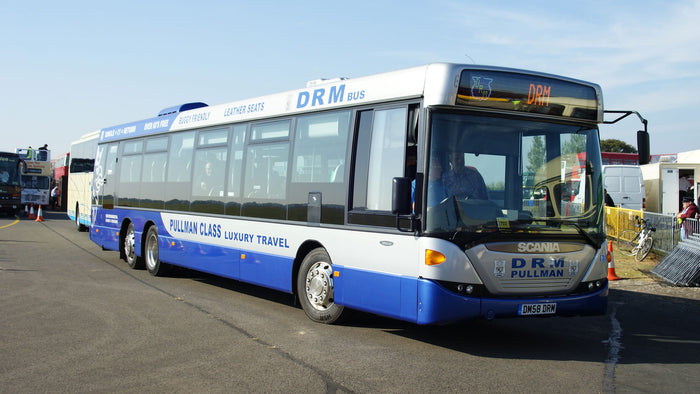DRM Buses Case study

DRM Buses, Bromyard DRM Buses is a quality modern operation in rural Herefordshire. Founded by proprietor David Morris in 1984, the company has focussed on bus operation since the 1990s and now operates 15 vehicles on commercial, supported and school services across north east Herefordshire, some continuing into the west of Worcestershire.
The fleet is renowned for the operation of high capacity vehicles, six low entry three axle Scanias are currently in service providing the flexibility required to cope with peak loadings, particularly at school times. The remainder of the fleet consists of standard Scania Omnicities and Omnilinks together with older Dennis Darts, a Volvo B6BLE and the latest addition, a Euro6 MCV bodied Volvo B8RLE which is the first new Volvo purchased for 15 years.
David is passionate about his local community and the role local companies such as his play in its support, both through local procurement and promotion of the area to visitors. Serving a predominantly rural area, the company is continuously looking at opportunities to reduce its operating costs and maintain service viability. It works closely with Herefordshire Council to integrate school requirements with its core service network and in 2015, it took on the Worcester-Bromyard Hereford service following First’s decision to exit from Hereford.
Fuel, sourced locally from Callow Oils, is a significant cost to the business so following a visit from Efficient Fuel Technologies’ Paul Widdowson early in 2016, Fleet Engineer Steve Palmer instituted a two month trial of Dipetane in two vehicles. This showed a reduction of between eight and ten percent in fuel used and a reduction in emission levels measured at the vehicles’ four weekly inspection.
Based on the success of the trial, the use of Dipetane was extended to the whole fleet. Steve chose to dispense the Dipetane by adding it to the onsite storage tank, ‘It was the easiest way to do it and we know each vehicle gets the same dose.’ Around 30,000litres of fuel are used every month and a 25litre container of Dipetane is added to each regular delivery. Steve has however noticed ongoing reductions in the volume of fuel needed at each delivery since Dipetane was introduced, highlighting that the product is working on a fleet wide basis and now delivering overall savings at the levels experienced in the trial.
Although fuel for all vehicles is dispensed through a key system requiring the input of odometer readings, two vehicles, one 63 plate, the other one a 10 plate are specifically monitored as they should be working the same diagram all the time and hence give a true representation of the impact of Dipetane. Whilst the vehicles are normally allocated to regular routes, it is not the same with drivers who rotate duties and Steve has identified variations in fuel usage between them. To improve this situation, Steve has taken advantage of the driver training support that Scania offers in support of its new vehicle purchasers.
The company reports that it receives regular and reliable deliveries of Dipetane, eight 25litre containers at a time. For the company, Dipetane has delivered a reduction of operating costs whilst the reduction of emissions can only be of benefit to the historic market towns of Herefordshire that the company serves.
